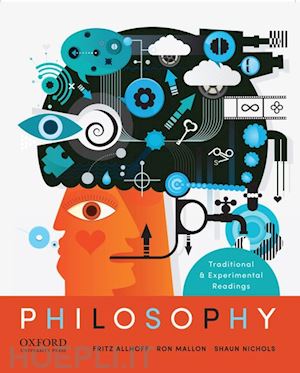Preface: ; Acknowledgments: ; PART I: KNOWLEDGE AND REALITY; Chapter 1: Belief in God; Kevin Timpe: Introduction; 1.1a. Anselm: Proslogion; 1.1b. Gaunilo: A Reply on Behalf of the Fool; 1.2. Thomas Aquinas: Summa Theologiae; 1.3. William Paley: Natural Theology; 1.4. Blaise Pascal: Pens'ees; 1.5. Peter van Inwagen: The Argument from Evil; 1.6. Sigmund Freud: The Future of an Illusion; 1.7. Alvin Plantinga: Warranted Christian Belief; 1.8. Deborah Kelemen: Are Children "Intuitive Theists"?; 1.9. Daniel Dennett: Breaking the Spell; Chapter 2: Skepticism and the Analysis of Knowledge; James Beebe and Anand J. Vaidya: Introduction; 2.1. Sextus Empiricus: Outlines of Pyrrhonism; 2.2. Ren'e Descartes: Meditation I: Concerning Those Things That Can Be Called into Doubt; 2.3. George Berkeley: Principles of Human Knowledge; 2.4. G. E. Moore: Proof of an External World; 2.5. Edmund Gettier: Is Justified True Belief Knowledge?; 2.6. Alvin Goldman: What Is Justified Belief?; 2.7. Shaun Nichols, Stephen Stich, and Jonathan Weinberg: Meta-Skepticism: Meditations in Ethno-Epistemology; Chapter 3: Explanation and Causation; Alexandra Bradner: Introduction; 3.1. Aristotle: Physics, Posterior Analytics, Physics; 3.2. David Hume: Enquiry Concerning Human Understanding; 3.3. Albert Michotte: The Perception of Causality; 3.4. David Lewis: Causation; 3.5. Laura Scultz, Tamar Kushnir, and Alison Gopnik: Learning from Doing; PART II: MIND AND SELF; Chapter 4: Mental States; Mark Phelan and Eric Mandelbaum: Introduction; 4.1. Ren'e Descartes and Princess Elisabeth: How Can Souls Move Bodies?; 4.2. Paul Bloom: The Duel between Body and Soul; 4.3. Mark Phelan, Eric Mandelbaum, and Shaun Nichols: Brain Damage, Mind Damage, and Dualism; 4.4. Paul Churchland: Eliminative Materialism and the Propositional Attitudes; 4.5. Ron Mallon, Edouard Machery, Shaun Nichols, and Stephen Stich: Against Arguments from Reference; 4.6. Jerry Fodor: The Persistence of the Attitudes; 4.7. Daniel Dennett: Real Patterns; 4.8. Alison Gopnik and Henry M. Wellman: Why the Child's Theory of Mind Really Is a Theory; 4.9. Joshua Knobe: Person as Scientist, Person as Moralist; Chapter 5: Consciousness; Emily Esch and Joshua Weisberg: Introduction; 5.1. Ren'e Descartes: Meditations on First Philosophy; 5.2. Gottfried Leibniz: The Monadology; 5.3. T. H. Huxley: On the Hypothesis That Animals Are Automata, and Its History; 5.4. Frank Jackson: Epiphenomenal Qualia; 5.5. David Chalmers: The Puzzle of Conscious Experience; 5.6. Patricia Churchland: The Hornswoggle Problem; 5.7a. Martha J. Farah: Visual Perception and Visual Awareness after Brain Damage: A Tutorial; 5.7b. Michael Tye: Ten Problems of Consciousness; 5.8. Justin Sytsma: Folk Psychology and Phenomenal Consciousness; Chapter 6: Free Will and Moral Responsibility; Stephen Morris and Chris Weigel: Introduction; 6.1. Kai Nielson: The Compatibility of Freedom and Determinism; 6.2. Roderick Chisholm: Human Freedom and the Self; 6.3. Galen Strawson: The Impossibility of Moral Responsibility; 6.4. Harry G. Frankfurt: Freedom of the Will and the Concept of a Person; 6.5. Eddy Nahmias, Stephen Morris, Thomas Nadelhoffer, and Jason Turner: Surveying Freedom: Folk Intuitions about Free Will and Moral Responsibility; 6.6. Daniel Wegner: The Illusion of Conscious Will; 6.7. Alfred R. Mele: Free Will and Luck; Chapter 7: Persons and the Self; Emily Esch: Introduction; 7.1. John Locke: An Essay Concerning Human Understanding; 7.2. Thomas Reid: Essays on the Intellectual Powers of Man; 7.3. David Hume: Treatise of Human Nature; 7.4. Derek Parfit: Divided Minds and the Nature of Persons; 7.5. Paul Bloom: First Person Plural; PART III: VALUE THEORY; Chapter 8: Meta-Ethics; Tamler Sommers and Jennifer Cole Wright: Introduction; 8.1. Herodotus: Culture Is King; 8.2. Plato: Why Be Moral?; 8.3. A. J. Ayer: Emotivism; 8.4. J. L. Mackie: Error Theory; 8.5. Michael Smith: The Moral Problem; 8.6. James Rachels: The Challenge of Cultural Relativism; 8.7. John Doris and Stephen Stich: Empirical Approaches to Metaethics; 8.8. Jennifer Cole Wright and Hagop Sarkissian: Folk Meta-Ethical Commitments; Chapter 9: Normative Ethics; Kevin Timpe: Introduction; 9.1. Aristotle: Nicomachean Ethics; 9.2. Immanuel Kant: Groundwork for the Metaphysics of Morals; 9.3. John Stuart Mill: Utilitarianism; 9.4. John Doris: Persons, Situations, and Virtue Ethics; 9.5. Joshua Greene: The Secret Joke of Kant's Soul; Chapter 10: Philosophical Method; Anand J. Vaidya and Michael Shaffer: Introduction; 10.1. Plato: Meno; 10.2. Ludwig Wittgenstein: Philosophical Investigations; 10.3. Stephen P. Stich: Plato's Method Meets Cognitive Science; 10.4. Ernest Sosa: Experimental Philosophy and Philosophical Intuition; Glossary: ; About the Editors:











